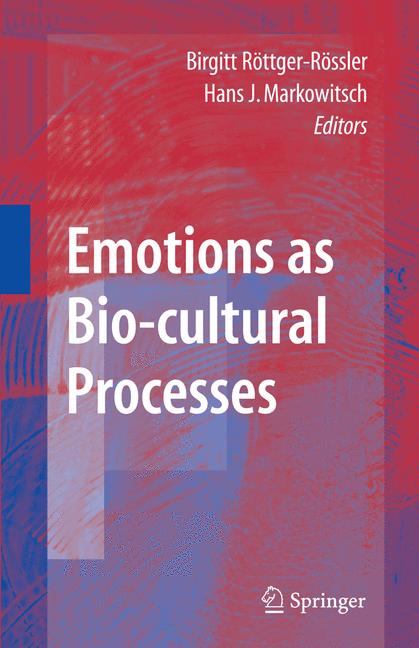
Emotions As Bio-Cultural Processes
by Birgitt Röttger-Rössler (Editor), Hans J. Markowitsch (Editor)
ISBN-10: 0387741348
ISBN-13: 9780387741345
$109.99
Book Specs
Trade Cloth
Springer
Published on
Nov 11, 2008
Edition
1st Edition
Dimensions
6.10x1.00x9.30 Inches
Weight
2.31 Pounds
About the Book
Emotions have emerged as a topic of interest across the disciplines, yet studies and findings on emotions tend to fall into two camps: body versus brain, nature versus nurture. Emotions as Bio-cultural Processes offers a unique collaboration across the biological/social divide--from psychology and neuroscience to cultural anthropology and sociology--as 15 noted researchers develop a common language, theoretical basis, and methodology for examining this most sociocognitive aspect of our lives. Starting with our evolutionary past and continuing into our modern world of social classes and norms, these multidisciplinary perspectives reveal the complex interplay of biological, social, cultural, and personal factors at work in emotions, with particular emphasis on the nuances involved in pride and shame.
A sampling of the topics: (1) The roles of the brain in emotional processing. (2) Emotional development milestones in childhood. (3) Social feeling rules and the experience of loss. (4) Emotions as commodities? The management of feelings and the self-help industry. (5) Honor and dishonor: societal and gender manifestations of pride and shame. (6) Emotion regulation and youth culture. (7) Pride and shame in the classroom.
A volume of such wide and integrative scope as Emotions as Bio-cultural Processes should attract a large cohort of readers on both sides of the debate, among them emotion researchers, social and developmental psychologists, sociologists, social anthropologists, and others who analyze the links between humans that on the one hand differentiate us as individuals but on the other hand tie us to our socio-cultural worlds.
